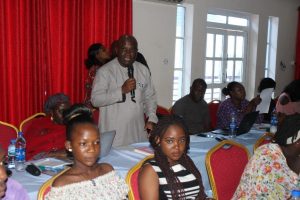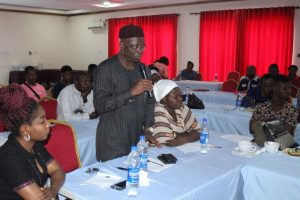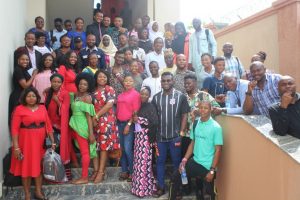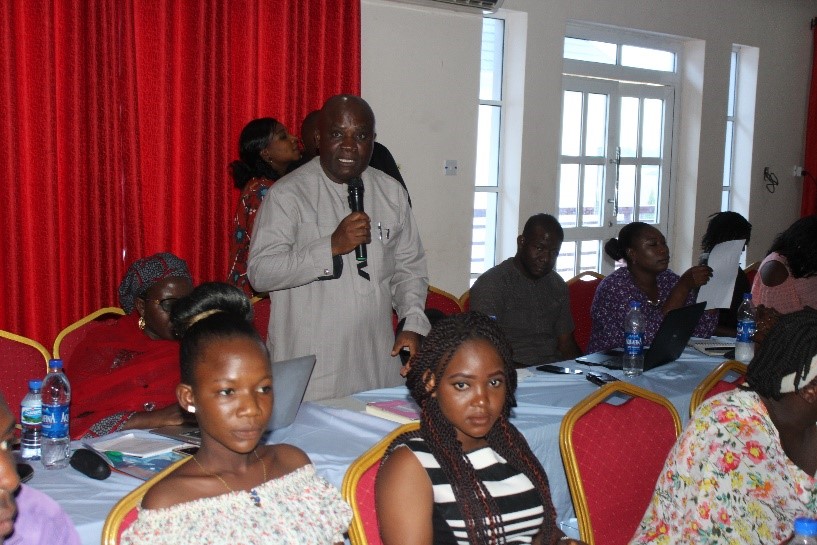
HIFASS together with partners bows out on the GF-HIV-NFM extension project in FCT
November 4, 2019
HIFASS commemorates 2019 World AIDS Day in collaboration with NACA
November 25, 2019In the last 9 months, HIFASS has been executing a project funded by Global Fund on the Global Fund HIV New Funding Model (GF-HIV-NFM) extension alongside with Society for Family Health (SFH) who are the Principal Recipient (PR) of the project together with implementing partner, an FSW-led CBO, Passion and Concern for Women Welfare and Empowerment Initiative (PACOWWEI) in the Federal Capital Territory.
The project sought to reduce the impact of HIV and AIDS among the key population by strengthening the capacity of Key Affected Populations (KAP) local organizations to deliver and impact positively in the lives of female sex workers with their clients at the grassroots level with key, high-quality HIV prevention and Minimum Prevention Package Intervention (MPPI) within Bwari, Gwagwalada and Kwali Area Council of the FCT.
As part of the closeout activities for the GF-HIV-NFM extension project with SFH, an external stakeholder’s closeout meeting was held for all implementing partners working on the project on 19th June, 2019 at Stanzel Grand Resort, Abuja.
The aim of the meeting was to update the FCT stakeholders on the progress in implementation of the change ideas models amongst HIV Vulnerable and high risk Adolescent Girls and Young Women (AGYW), MSM, FSW and PWID in FCT. And also, to obtain feedback from stakeholders on GF-HIV-NFM extension phase implementation in FCT.
According to the report presented at the meeting, the State Program Specialist, Berkisu Momoh from SFH cited that the MPPI target of 2440 given was reached and surpassed by 2658 which was said to be impressive and has brought the project to a successful end in the FCT.

Speaking further, Dr Uche Okoro, the Project Manager for FACA and a major supporter of the programme said he remains grateful to SFH for recognising the state actors right from the state level to the community level likewise having FCT to be part of the intervention right from the planning to implementation. “The intervention was very impactful as lives were touched positively especially the Adolescent and Young People (AYPs) who were left behind and the project successfully reached out to them with high quality prevention services although there is always room for improvement.”
“The project has contributed greatly in reducing the HIV prevalence from 5.6% in 2014 to 1.6% in 2019 within the FCT and has been able to build capacity for community members which would help in the sustainability plan of the programme. Also, at state levels, we provide condoms, STI treatments and HIV Testing services (HTS) and would continue to work with trained AYP Champions in the various communities as a channel of distributing commodities. I hope that SFH comes back with a new project and continue to provide services to KPs.” He said

Speaking also, Mr Lambant Opara, Director Corporate Affairs and External Linkages of NHRC said he is highly impressed by the presentations made towards the end of project as sponsored by Global Fund. “So far, the programme is an all-inclusive programme, and I’m impressed at the statistics shown on the reduction on STDs as a result of the teams advocacy programme. I advise that sustainability to fund the programme can be sourced elsewhere regardless of the major source of funding being exhausted. The sustainability of the programme lies with Global Fund but the commission is always willing to support legally and provide opportunities for those living with the scourge to seek redress when their rights are being violated.” He said
In attendance were state actors such as FCT Agency for Control of HIV/AIDS (FACA), AMAC Agency for the Control of AIDS (ACACA) Gwagwalada and Bwari Area Council, National Human Rights Commission (NHRC), National Drug Law Enforcement Agency (NDLEA), Police Hospital Garki, Chief of Gbazango community, implementing partners from various CBOs, CSOs, Line Ministries and other networks.



